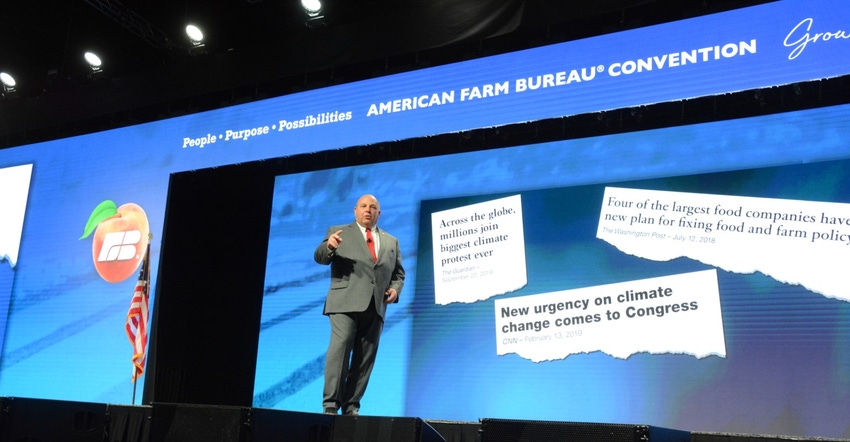
As the voice of farmers representing 6 million members, American Farm Bureau Federation President Zippy Duvall celebrated 2021 victories and called on AFBF members to continue to share their stories on the impact of policy and the importance of agriculture at the 102nd AFBF annual convention January 9, held in Atlanta, Ga.
In his address to members Sunday morning, Duvall shares that AFBF’s strength is its grassroots, and credited it with their success in protecting stepped-up basis as well as securing a bipartisan infrastructure win.
“We need that same energy and passion when it comes to WOTUS,” Duvall says of the rewrite of the waters of the U.S. rule now being undertaken by the Biden administration. “It is critical that this administration understands that we should not need a team of lawyers and consultants just to farm our land.”
Duvall says leadership on sustainability and climate policy has helped establish agriculture’s leadership on a topic driving many conversations on the policy front. “I personally cannot recall another time when I’ve heard so many leaders on both sides of the aisle acknowledge U.S. agriculture’s leadership on sustainability.”
Although the Build Back Better plan included $90 billion for agriculture, including $28 billion for farm conservation programs, Duvall says the process lacked bipartisanship and the organization did not support BBB because of the high costs and inflationary concerns.
AFBF will continue to ensure this “administration is poised to make sure that they use sound science and deliver those tools to our farmers so that we can continue to expand our sustainability movement in protecting our climate,” Duvall says.
Infrastructure passage shows bipartisanship
Duvall also says thanks to the united voice offered by AFBF and other ag groups, Congress passed – and President Joe Biden signed – a bipartisan infrastructure bill to invest in roads, bridges, ports and waterways as well as invest in Western water infrastructure and expand rural broadband access.
Andrew Walmsley, AFBF senior director of congressional relations, explains the $110 billion for traditional infrastructure will mostly be in the form of grants to states, which will then allocate funds locally. The funding for ports and waterways will be important in helping get U.S. ag products to customers, however, it will not address many of the supply chain challenges facing the industry today.
“Infrastructure isn’t just about roads and bridges anymore,” Duvall says. “It’s also time for us to bridge the great digital divide.”
Emily Buckman, AFBF director of congressional relations, says the infrastructure bill’s $65 billion investment in broadband offers a “huge investment” for rural America as $42.5 billion of that will go towards states’ broadband offices to invest. AFBF will be working with state offices to ensure rural America’s interests are heard.
Each state will receive $100 million, which will be important for states to have the capacity and technical assistance to accept those dollars and ensure they can actually get that amount of money out the door, Buckman says.
“We’ll see how quickly they’re able to get those dollars out the door,” she adds. “We’re excited to see an infusion of money going out the door soon.”
Ag labor woes continue
When Duvall first took over as president of the organization six years ago, the need for ag labor reform was his top concern. And he lamented that has not improved since then.
“We just got to stop and take a look at what the serious problem is with labor around agriculture. I can't tell you with enough emphasis that this administration and this Congress has got to start paying attention,” Duvall says of the ongoing ag labor problem.
“What's happened in our fields and in our barns and the lack of people to help us do our job is driving agriculture in the wrong way. The general public loves the family farm, and we need to make sure that our family farms don't have to jump through so many hoops to get the labor.”
Fertilizer prices dampening ag outlook
During a breakout on farm policy, John Newton, senior economist on the republican side of the Senate Agriculture Committee, says the overall farm economy shows higher net farm income and farm profitability because of strong exports and an overall rebound of the farm economy. However, some inflationary pressure is facing those in farm country. Newton says every farmer coming into his office is concerned about rising fertilizer prices up 200% to 300%.
"Every single farm has seen input prices higher this year," Newton says, adding that University of Illinois ag economists project farm income could drop by 20% due to higher input costs.
When asked about what farmers are saying about rising input costs, particularly fertilizer, Duvall notes, “They're concerned about the prices and, and they're even more concerned about the availability of it.”
During a press conference, Duvall says the organization is very concerned about the interruption in fertilizer supplies, whether it involves the ports or tariffs. “We’ve got to find a solution to it because the weather’s not going to wait on us. Corn has got to be planted at the right time, and it’s got to be side-dressed at the right time,” he says.
About the Author(s)
You May Also Like






